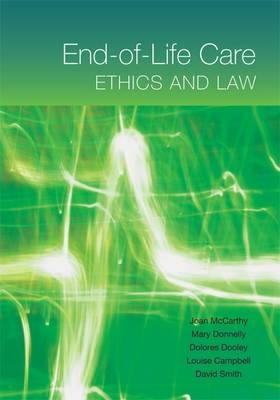
End-of-life Care
Cork University Press (Verlag)
978-1-85918-481-3 (ISBN)
- Titel ist leider vergriffen;
keine Neuauflage - Artikel merken
The educational aim of the Framework is not to tell people what to do, but to offer tools for thinking about difficult ethical and legal issues that arise in relation to death and dying. The objective is to foster a range of ethical skills and competencies to ensure that decisions are arrived at in the most reasonable, sensitive and collaborative way possible. Readers are introduced to the process of ethical reasoning and resolution through interactive learning and reflection on case studies drawn from practice in clinical settings in Ireland and elsewhere. These bring into sharper focus the need for sensitivity to the unique stories and circumstances of individual patients and their families.
Joan McCarthy & Mary Donnelly (University College Cork), Dolores Dooley & David Smith (Royal College of Surgeons in Ireland), Louise Campbell (ClinicalEthics Ireland)
Module 1: Explaining Ethics Discusses one key notion that is linked with death and dying; the meaning of a 'good death'. Describes a range of different approaches to moral problems and distinguishes ethics from other perspectives such as religion and the law. Module 2: The Ethics of Breaking Bad News Explains why telling patients the truth about their condition is important and reflects on the challenges that diverse cultural perspectives on patient and family relationships present to health professionals when they are considering breaking bad news. Presents arguments for and arguments against, breaking bad news. Module 3: Healthcare Decision-making and the Role of Rights Considers the way in which deeply-held moral values in relation to dying and death have been enshrined and expressed in laws and court decisions. Explains the relationship between moral and legal rights and discusses the advantages and the limits of taking a rights based approach to the decision making process at end of life. Module 4: Patient Autonomy in Law and Practice Explains the legal right of patients to refuse treatment as well as the positive right of patients to control and direct how their treatment and care proceeds. Evaluates the contribution of an autonomy-based model and the limits of patient autonomy and outlines the legal test of capacity, and the health professional's obligation to facilitate the participation of patients who lack capacity. Module 5: The Ethics of Managing Pain Describes the different kinds of pain and suffering that patients may endure and considers reasons why adequate pain relief may not be provided to different patient groups. Explains the challenge of determining adequate and proportionate responses to patients' pain and ethically evaluates palliative measures that are sometimes provided to alleviate extreme and intractable suffering. Module 6: The Ethics of Life Prolonging Treatments (LPTs) Explains the ethical and legal concerns that arise in relation to decisions not to start or to discontinue the use of life sustaining therapies. Presents and considers different positions on the ethical and legal status of euthanasia and assisted suicide. Module 7: The Ethics of Confidentiality Describes the onus on health professionals to protect the confidentiality and privacy of patients who are dying and deceased. Discusses exceptions to the ethical and legal requirement of confidentiality and the relevant interests of others such as patients' families. Module 8: Ethical Governance in Clinical Care and Research Outlines and considers the role of Clinical Ethics Committees and the process of ethics consultation in clinical practice. Charts the emergence of Research Ethics Committees and their contribution to the regulation of research and the protection of research participants.
| Erscheint lt. Verlag | 11.11.2011 |
|---|---|
| Verlagsort | Cork |
| Sprache | englisch |
| Maße | 196 x 294 mm |
| Themenwelt | Medizin / Pharmazie ► Medizinische Fachgebiete ► Medizinethik |
| Studium ► Querschnittsbereiche ► Geschichte / Ethik der Medizin | |
| Studium ► Querschnittsbereiche ► Prävention / Gesundheitsförderung | |
| Recht / Steuern ► EU / Internationales Recht | |
| Recht / Steuern ► Privatrecht / Bürgerliches Recht ► Medizinrecht | |
| ISBN-10 | 1-85918-481-2 / 1859184812 |
| ISBN-13 | 978-1-85918-481-3 / 9781859184813 |
| Zustand | Neuware |
| Haben Sie eine Frage zum Produkt? |
aus dem Bereich


